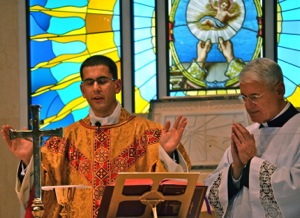
 USIC AT MASS is all about the choir, right? Wait, the cantor on a microphone? Really it’s all about the organist who can play the loudest. The musicians provide all the music that is important or that is needed, right? But the most obviously element to sacred music is often the most overlooked.
USIC AT MASS is all about the choir, right? Wait, the cantor on a microphone? Really it’s all about the organist who can play the loudest. The musicians provide all the music that is important or that is needed, right? But the most obviously element to sacred music is often the most overlooked.
What happens when a priest sings the Greeting? Intones the Gloria? Sings the Collect? The Preface Dialogue and Preface? The Institution Narrative? The Lord’s Prayer? Etc.?
What is going on here?
The priest is singing more than the choir. The priest is singing the Mass. The people are responding to the dialogues. The choir sings. The people sing even more. Fitting are the words of the Exsultet: “Let this holy building shake with joy!”
Where appropriate, the choir sings. The choir has its role—a very important one: sometimes to simply sing with the congregation or enhance, fostering the unity of the faithful and exterior participation. Other times it is to sing alone to foster interior participation.
The choir’s role is indeed important, but it is only a part of a larger unified role. Ideally, sacred music is a wider effort that goes well beyond the choir loft. It emanates from the choir loft and from the sanctuary. It comes to fruition in the pews and resonates in song and in the heart. Music—hence prayer—is unified throughout the sacred space.
The priest’s musical role is enormously influential for the congregation. But not all priests are comfortable singing. Remember, a small amount of singing from a priest will yield enormous dividends. This can not be emphasized enough. Even singing recto tono (singing on one note only) for the Greeting or Collect can energize a congregation. (Keep it simple!) This in turn can kick start a congregation to sing everything else more robustly.
I encourage all priests to sing even a little bit. I encourage all music directors to work with and encourage their clergy. A few notes at Mass will be a mustard seed that will yield great fruit.
At all times, all sacred music—whether sung by the priest, choir, or congregation—the role of sacred music is to help the faithful pray the texts of the Mass. Ultimately, whatever our individual role is during the liturgy, all are working towards the same goal: the edification and sanctification of the people—the salvation of souls.

PRIESTS! DEACONS! CHOIRS! Want to sing the Mass and learn the chants of The Roman Missal? Here they are:
